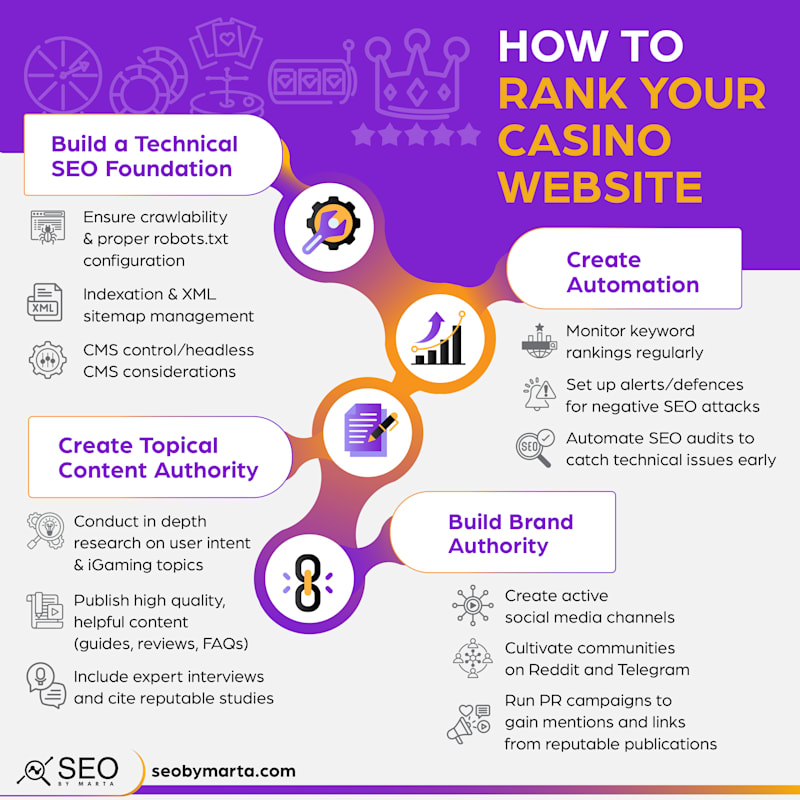One of the most competitive areas of digital marketing is iGaming SEO. Experts predict that the global online gambling market will surpass $169 billion in value by 2030. There are thousands of operators and affiliates competing for the same few top spots on Google and in AI Search. The competition is enormous. If you’re reading this, you may be wondering how to rank a casino or sportsbook website in 2026. Should you even bother? The challenge is huge, but you can still succeed. You need the right plan, accuracy, and determination.
This iGaming SEO Guide will teach you the most basic SEO tactics (mostly white-hat and gray-hat) to get your site noticed and compete with the most prominent online gambling brands.
What is iGaming SEO?
iGaming SEO is the process of optimising online gambling websites, including casinos, sportsbooks, and lottery platforms, to improve their search engine visibility and attract high-intent traffic.
The main goal of iGaming SEO is to drive more organic traffic from people interested in gambling by improving the search engine rankings of branded and generic “money keywords” such as “best online casinos” and “best betting sites.” The primary purpose is to attract more FTDs (First Time Deposits) and increase overall revenue.

Key Components of Casino SEO:
Content SEO: Also known as On-Page SEO, revolves around enhancing the site’s contextual authority by creating and optimizing SEO content for main pages and individual games. This involves improving the content, user experience (UX), and site structure.
Technical SEO: Focuses on enhancing the site’s credibility and usability by addressing technical SEO elements such as hreflang tags, canonical tags, and page speed.
Off-Page SEO: Building high-quality backlinks from reputable websites to increase the site’s authority and trustworthiness in the eyes of search engines.
What is iGaming?
iGaming, or online gaming, is an umbrella term for any form of gambling activity that happens on the internet.
This can include:
Online Casino Games: Digital versions of classic casino games like poker, blackjack, roulette, and slot machines. Players can play these games on their laptops, tablets, or phones.
Sports Betting: Online iGaming sites where users can bet on different sports events, such as football, basketball, horse racing, and esports.
Lotto: Players can buy tickets and participate in various lottery drawings online through lottery services.
Poker: Many iGaming sites offer virtual poker rooms where players can play a variety of poker games and tournaments.
The iGaming industry operates the following business models:
Operators: Companies that run online casinos and sports betting sites, which let people gamble in many ways.
Affiliates: Websites and services that compare, review, and promote operators’ online casinos and sports betting platforms, earning commissions for referring players.
Providers: Companies that develop and supply the games and software operators use on their platforms.
Anyone who works in or is interested in the iGaming industry needs to know about these parts and business models.
SEO Strategies for Ranking a Website in the iGaming Niche

To get a website to the top of the highly competitive Casino and Sports Betting niche, you need a full and varied iGaming SEO strategy. Because of its competition and complexity, it can sometimes be different from regular SEO. Here are some of the most important things you can do to make your website rank higher:
1. Building a Technical SEO Foundation
For your iGaming website to succeed, you need a strong technical SEO foundation. Most casino platforms use a headless CMS, which isn’t as good for SEO as WordPress, for example. Most of the larger gambling sites don’t have any basic SEO requirements in place. Here are some common problems and essential questions you should think about as you start your Gambling SEO journey.
Crawlability, Indexation
Crawlability: Ensure your site is accessible and crawlable by Googlebot and other search engine crawlers. Check your site’s robots.txt file to ensure it allows search engines to crawl important pages.
Indexation: Ensure that Google can index your SEO pages. Verify that meta tags are correctly implemented.
Sitemap and robots.txt
Ensure your website has an XML sitemap that lists all important pages and is submitted to Google Search Console. Verify that your robots.txt file is correctly configured to allow search engines to crawl your important pages while blocking access to irrelevant or sensitive areas.
CMS Control
SEO Content: Ensure your Content Management System (CMS) lets you easily add and edit SEO content.
Localization: Check if your CMS supports localization, which allows you to create region-specific content to target different markets.
SEO Headings and Meta Tags: Ensure you can add and manage SEO headings (H1, H2, H3, etc.) and important meta tags. Remember, proper heading hierarchy is crucial for both user experience and SEO.
2. Creating automation for ranking monitoring, attacks and SEO audits
Negative SEO attacks and technical issues are common in the iGaming niche and can significantly impact rankings and traffic. So, it’s crucial to set up strong keyword tracking, ranking monitoring, and automated SEO audits to ensure your site stays visible. Here’s how to do this.
Keyword Tracking and Rankings Monitoring
Daily Ranking Monitoring: Due to the nature of the iGaming niche, rankings should be monitored daily, not weekly or monthly, like in other industries. This allows you to identify and respond to any significant changes quickly.
Tools: SEranking is among the best for daily ranking movements and keyword tracking automation. It provides comprehensive insights into your keyword performance, helping you stay on top of your rankings.
SEO Audits Automation
Regular Audits and Error Detection: Automated SEO audits should be conducted weekly to check for technical issues, such as noindex tags accidentally applied after development changes to your SEO pages.
Alerts and Notifications: Don’t forget to set up alerts for significant ranking drops or spikes. This immediate feedback allows you to investigate and address potential issues promptly.
Tools: JetOctopus can automate technical SEO audits and alert you to critical issues. ZipTie is also an excellent Tech SEO tool that can quickly detect indexation issues in your Sitemap.
Integration with Development Processes
Collaboration with Development Teams: Maintain open communication with your development team to prevent accidental SEO issues during deploys. Regular educational SEO training and documentation can help the dev team understand SEO implications.
Management of Changes: Implement a robust change management process to track and review website changes. This will help quickly identify and reverse any changes that negatively impact SEO.
3. Creating Topical Content Authority
To do well in this very competitive niche, you need to establish yourself as an authority on topical content. You can attract more organic traffic, achieve higher search engine rankings, and build a loyal audience by making your site look like a reliable source of information. Here are some ways to do this.
In-Depth Research
Understand Your Audience: Conduct thorough research to learn your target audience’s needs, preferences, and pain points. This will help you create content that resonates with them.
Competitive Analysis: Analyze your competitors’ content to identify gaps and opportunities. Focus on topics that are underrepresented but relevant to your audience.
Leveraging internal data: Use your in-house data for content prioritization. Most casino companies have internal tracking tools that show you, for example, the top games per market with the highest revenue. Google Search Console will also give you insights into your audience’s top queries.
High-Quality Helpful Content Creation
Comprehensive Guides: Create in-depth guides and tutorials on various aspects of iGaming, such as game rules, strategies, and tips. Ensure your content is well-researched, detailed, and provides real value.
Regular Updates: Keep your content up-to-date with the latest trends, news, and developments in the iGaming industry. Regular updates signal to search engines that your content is fresh and relevant.
Content Diversification: Incorporate various types of content, such as videos, infographics, or tables. Multimedia content can enhance engagement and reach a broader audience.
User-Generated Content: Encourage users to contribute reviews, testimonials, and forum posts. This will diversify your content and build a community around your brand.
Experience and Expertise: Hire people who love to play casino games or bet themselves. You can see the difference in the content creation process.
Add something unique: Your content should contain some unique information not covered by completion. For example, in games, this could be your casino bonus for this specific game.
Optimising for Generative AI Search Engines
- Write content that Large Language Models (LLMs) can easily understand, extract, and reuse in AI-generated answers. This means structuring information clearly, answering questions directly, using consistent terminology, and providing factual, well-sourced statements. Generative AI search engines prioritise content that demonstrates clarity, topical depth, and real expertise. Well-structured sections, concise explanations, and clear author credibility increase the likelihood that your content will be cited in AI answers rather than ignored.
4. Building a Link Authority
Developing a strategic link-building plan is essential for acquiring high-quality backlinks from reputable sites and boosting your site’s authority and rankings. Here are some effective strategies for gambling websites:
Using Your Brand and Website Power
Leverage your internal PR and marketing: Any CEO interview or other company publications on third-party websites should result in a dofollow link to your main brand. Educate everyone in the marketing and PR department on the importance of links, and you will get them for free.
Leverage sponsorships: If your brand sponsors a major sports event or team, negotiate to include a dofollow link as part of the sponsorship deal. This can significantly boost your site’s authority and visibility.
Link relationships: If you have good relationships with larger affiliates, ask if they can provide a dofollow link. While many affiliates may hesitate to add such links near their affiliate tracking links, it is sometimes possible. Conversely, it’s often easier to obtain a dofollow link from an operator’s dedicated review site rather than the main platform.
Create link-worthy content: Create infographics, research studies, and interactive content that other websites want to link to. This can help you get organic and free links from relevant websites.
Happy customer reviews: Collaborate with your customer support team to identify your happiest users and encourage them to leave reviews on forums and third-party websites. These reviews can generate referral traffic and sometimes even dofollow backlinks.
Collaboration with External SEO Agencies
Link-building Agencies: Partner with external SEO agencies, for example, a link-building marketplace such as https://serpier.com/ or SEO Experts specialising in link-building for the iGaming niche. They can leverage their expertise and connections to acquire high-quality backlinks.
Digital PR Campaigns: Find the best agency to create a digital PR campaign for you. This can help you get a good number of links, especially if your brand doesn’t have an internal PR department or your link profile is very small compared to your competitors. Ensure the campaign’s topic is not too far from your niche and the anchor is relevant.
Adapting to Industry Standards
Study Competitors: Analyze Competitor Link Profiles: Use data from the top 5 to top 10 stable competitors in each market to study their link profiles. Examine link velocity (the rate at which they acquire new links), anchor text distribution, and the topical relevance of the websites linking to them. Compare your link profile with competitors to identify gaps and opportunities for improvement. This benchmarking can help you develop a more effective link-building strategy.
Budgeting for High-Quality Links: High-quality links often come at a cost. Discuss with management to secure a reasonable budget for link-building activities before setting Key Performance Indicators (KPIs). Ensuring adequate resources is crucial for acquiring premium backlinks that can significantly impact your rankings.
Stay Informed About Industry Standards: Stay abreast of the latest trends, tools, and best practices in the iGaming industry. This includes attending industry conferences and webinars and following authoritative blogs and forums. Stay updated on any changes in regulations that could impact your link-building strategies. Adapting to these changes promptly can help maintain compliance and avoid penalties.
Difference Between the iGaming and e-Commerce Niche
The main difference between iGaming and e-commerce sites is what they do and how they make money. iGaming sites are only for online gambling. E-commerce sites, on the other hand, are all about buying and selling goods or services. They also differ in a few important ways.
Customer Retention Strategies: iGaming platforms often use bonuses, loyalty programs, and exclusive offers to retain players. E-commerce sites rely on strategies like personalized recommendations, discounts, and excellent customer service to keep customers coming back.
Regulatory Compliance: iGaming websites must navigate complex legal frameworks, adhere to stringent regulations, and obtain necessary licenses to operate. E-commerce sites must comply with consumer protection laws, payment processing regulations, and data privacy standards, though the regulatory landscape is generally less stringent than for iGaming.
Security Concerns: Both niches prioritize security, but the nature of the concerns differs. Due to the high financial stakes involved, iGaming sites focus heavily on preventing fraud, ensuring fair play, and protecting user data.
Marta Szmidt also covered this topic in detail in the podcast interview “Cutting Edge: Web Content Development” https://podcasts.bcast.fm/e/mn4xqj3n-seo-with-marta-szmidt
Why is iGaming so Competitive?
Many problems make running an online casino or sports betting site very hard. These problems include intense competition, the challenge of gaining user trust, and the complexity of the technology involved. This niche is also one of the most competitive in SEO because the main competitors have very high link and content budgets that smaller companies can’t always reach. Here are some of the specific problems with casino SEO:
Regulatory Compliance
iGaming regulations vary significantly across different countries and regions. Ensuring the platform complies with all applicable laws is complex and requires continuous monitoring and adaptation. Regulatory bodies may restrict the type of content that can be published. Ensuring that promotional and informational content adheres to these regulations is crucial.
Advertising Restrictions
Major search engines and social media platforms have stringent advertising policies for gambling-related content. This limits opportunities for paid search campaigns and necessitates creative strategies to drive organic traffic.
Reputation and Trust Concerns
Many reputable websites are hesitant to link to iGaming sites due to concerns about legal issues and potential reputational damage. This makes acquiring high-quality backlinks a challenge in itself.
Building trust is more difficult for iGaming sites due to the stigma associated with gambling and concerns about fair play and security.
Technical Complexity
iGaming platforms are built for players, not for Search Engines. The headless CMS often used by operators is not SEO-friendly. Ensuring the website has all the necessary elements, such as SEO content, headings, or metatags, and provides a good user experience can be technically challenging.
Parasite SEO
Leveraging the authority of established platforms to rank content in search engines is a common practice in the casino and sports betting industry. Many competitors engage in unethical practices and can rank even for your branded keywords.
Spam Attacks
iGaming sites are frequent targets of spam attacks, including negative SEO tactics from competitors. It is not uncommon to get 1000 spammy anchors linking to your site or get good backlinks removed from your website in one day. Protecting the site’s SEO integrity involves proactive monitoring and robust security measures.
Conclusion
It’s not about quick fixes when it comes to ranking a casino website; it’s about mastering a system based on accuracy, testing, and consistency.
You can’t just copy what other people do to be successful in this area. You need to understand why they rank and develop a more innovative, cleaner strategy that goes deeper. Not only are the most prominent brands the best in iGaming, but they are also the most disciplined. They learn from their mistakes and change their plans faster than their competitors.
In a market where every SERP is a battlefield, the difference between being seen and not being seen isn’t luck; it’s strategy. And the people who learn it will be in charge of the next era of iGaming search.
FAQ: iGaming SEO—What You Need to Know in 2026
How Long Does it Take for a Casino Website to Rank?
It usually takes 6–18 months to get a casino website ranked, depending on your market, the level of competition, how quickly you build links, and the strength of your topical authority. Brand-new domains take even longer to rank. iGaming is one of the most competitive niches for SEO, so deadlines are longer than in other industries.
How Many Backlinks Do I Need to Get a New Casino Site to the Top of the Search Results?
There isn’t a set number of backlinks you need to get to rank in the top positions, but in competitive markets like iGaming, you may need hundreds or even thousands of relevant, authoritative links over time (if you are an operator).
What matters more than the number:
- Relevance
- Authority of the site where the link is placed
- Context of the anchor text
- Traffic coming from the link article
One strong contextual DR70 link is usually better than 20 weak ones.
How Do Casinos Build Trust and Authority?
Casino sites build trust by creating trustworthy brands. Positive customer experiences and reviews, along with excellent customer support, help create trust for gambling sites. Furthermore, E-E-A-T signals are necessary: hiring experienced players as content creators, creating comprehensive game guides, securing high-authority backlinks via sponsorships and PR initiatives, displaying licensing badges prominently, implementing strong technical SEO with security certificates, and maintaining transparency about payments and withdrawals. Regular content updates and regulatory compliance demonstrations further establish credibility with both users and search engines.
What Are the Best SEO Strategies for Gambling Sites?
The best SEO strategies for gambling sites are as follows:
- prioritize technical foundation with proper headless CMS configuration,
- implement daily ranking monitoring automation,
- leverage internal revenue data for content prioritization,
- create unique value like exclusive bonuses,
- automate weekly SEO audits,
- build strategic links through sponsorships and PR relationships,
- develop comprehensive topical authority clusters,
- study competitor link profiles for benchmarking, and
- allocate sufficient budget for premium backlinks in this highly competitive niche.
What's the Difference Between Casino SEO and Regular E-commerce SEO?
Casino SEO faces stricter regulatory compliance across jurisdictions, more difficult link acquisition due to reputational concerns, negative SEO attacks, restrictive advertising policies, and headless CMS technical challenges. For e-commerce sites, link building is easier because there are standard consumer regulations. Technical SEO is also less challenging than Casino SEO, as they have more SEO-friendly platforms.
How Do I Protect My Casino Website from Negative SEO Attacks?
Implement daily ranking and backlink monitoring using SEranking and Ahrefs, set automated alerts for ranking drops and suspicious link spikes. You should also conduct weekly automated technical audits with JetOctopus and monitor valuable backlink removals.
Can I Use AI Content for Casino and Sports Betting Websites?
Yes, you can use AI for content creation, but do it strategically. AI can efficiently generate game descriptions, betting guides, and informational content at scale. However, successful iGaming SEO requires human expertise, so it is essential to hire professional SEO content editors as well. AI is great for initial drafts, which are then enhanced with unique elements competitors lack: exclusive bonuses, proprietary game statistics, insider strategies, and authentic player experiences.
Should I Use Programmatic SEO for My Gambling Website?
Yes, you should; programmatic SEO is highly effective for iGaming sites with thousands of game pages and market variations. With Programmatic SEO, you can, for example, automate the creation of casino and game reviews, using templates populated with unique data—game RTPs, bonus offers, payment methods, and regional regulations.




